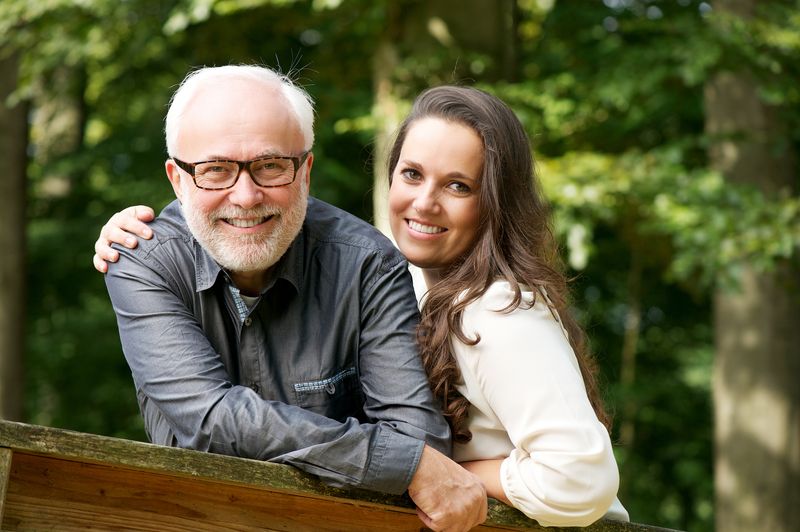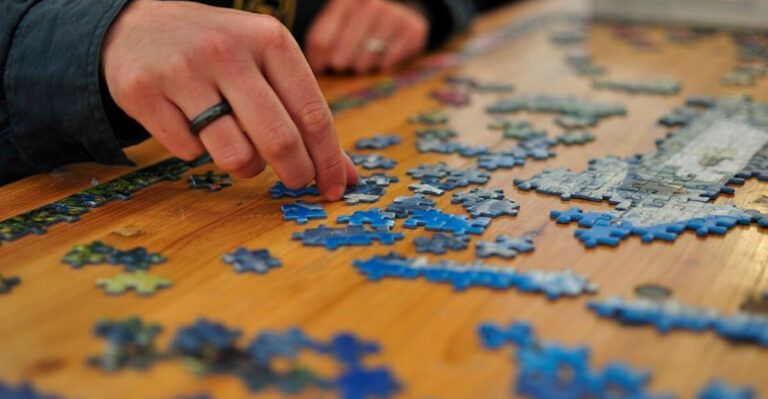18 Unexpected Ways Age Gaps Change a Marriage
Marrying someone with a significant age difference can be a bold, beautiful, and deeply unique journey. But once the wedding is over and real life kicks in, you start to notice that age gaps don’t just shape how you fall in love—they shape how you live love.
Sometimes it’s subtle. Sometimes it’s glaring. But it always adds layers you never quite expected. Here are 18 surprising ways an age gap can change a marriage—in both challenging and enlightening ways.
1. Different Stages of Personal Growth

One of you may be finding yourself, while the other feels settled. That can create a rhythm mismatch you’ll have to navigate—daily. With different stages of personal growth, the journey might feel like a dance where one is learning new steps, and the other is perfecting the routine.
The challenge lies in syncing these steps and creating a harmonious dance that suits both of you. Over time, you learn to adapt and appreciate each other’s pace. One might be exploring new interests or career paths, while the other finds joy in the stability of established routines.
It becomes a beautiful blend of discovery and support. You realize how each phase has its own charm and how sharing these moments adds a unique richness to your relationship. Rather than seeing these differences as barriers, you begin to cherish them as opportunities to grow together in unexpected ways.
2. Different Views on Time

The older partner may feel like there’s no time to waste. The younger one might feel like there’s still so much ahead. That difference can influence everything from big decisions to how you spend a Sunday. Imagine wanting to seize the day while your partner prefers to let it unfold naturally.
These differing perceptions can sometimes lead to conflicting priorities. For instance, one might want to plan a dream vacation soon, while the other is content waiting for the right moment. Yet, these differences can also balance the relationship, offering a mix of urgency and patience.
By acknowledging and respecting each other’s views on time, you can create a blend of spontaneity and careful planning. It becomes a delightful mix where the rush of ambition meets the calm of contentment, fostering a dynamic that keeps your life exciting and fulfilling.
3. Financial Timeline Differences

One of you might be planning for retirement, while the other is still paying off student loans. It requires careful (and honest) planning. Navigating these financial timelines means being open about your goals and crafting a strategy that honors both perspectives.
While one might be setting aside funds for retirement or investments, the other could be focusing on eliminating debt or building savings. It might feel like you’re on different financial planets, sometimes struggling to align priorities. But, through collaborative budgeting and open communication, you learn to harmonize these differences.
Finding common ground in financial planning fosters trust and mutual respect, transforming what could be a divisive issue into a unifying force. By seeing each other’s financial strengths and challenges, you’re empowered to build a future that considers both immediate needs and long-term dreams.
4. Growing Confidence During Marriage

The younger partner often grows into their confidence—during the marriage. And that personal evolution can shift dynamics in powerful, sometimes surprising, ways. Watching your partner blossom into their own skin, while daunting, is incredibly rewarding. It’s like witnessing a caterpillar transform into a butterfly.
As they grow, their newfound confidence can alter the relationship, sometimes making the older partner question their role. But it also brings fresh energy and ideas, sparking new adventures and shared experiences.
You learn to celebrate each milestone, whether big or small, and find pride in being part of each other’s evolution. This growth doesn’t just benefit one partner; it enriches the entire marriage, creating a vibrant atmosphere of mutual support and admiration.
5. Assumptions About Roles

People constantly assume you’re in two different roles—like parent and child. The stares, the comments, the awkward assumptions—you learn to brush it off, but it still stings sometimes. The world loves to label, and your relationship might not fit neatly into their boxes.
At first, these assumptions can be frustrating, making you question how others perceive your bond. But over time, you develop a resilient mindset, learning to focus on what matters: your connection. It’s a reminder that love defies conventional labels and societal expectations.
By standing strong against misconceptions, you affirm your choice and deepen your commitment. You become advocates for your own story, showing others that love transcends age and roles.
6. Health Issues Arise Earlier

The older partner may experience health issues sooner. And that can shift the emotional and physical balance of the relationship—sometimes earlier than expected. When health challenges arise, it’s a reality check on the preciousness of time and the importance of support.
As the younger partner, you might find yourself taking on a caregiver role, offering both emotional and practical assistance. This shift can be daunting, yet it opens an opportunity to deepen your bond through empathy and understanding. You learn to cherish everyday moments, making wellness a joint priority.
Whether it’s accompanying them to medical appointments or adjusting lifestyle habits together, these experiences teach resilience and adaptability. Health concerns become a shared journey, reinforcing the commitment to face life’s uncertainties as a team.
7. Different Ideas of Fun

Your ideas of “fun” might be wildly different. One of you wants to go out dancing. The other wants to stay in with a good book. Compromise becomes essential. Balancing these contrasting interests can feel like a playful tug-of-war, pushing each to explore beyond their comfort zones.
You might find yourself dancing at a lively club one night and enjoying a cozy movie marathon the next. These differences encourage both to embrace diverse experiences, enriching the relationship with variety and excitement.
By respecting each other’s preferences, you cultivate a space where both feel valued. In the end, these varied ideas of fun serve as a reminder that diversity in activities can be the spice that keeps your marriage exciting and ever-evolving.
8. Timing in Love

You realize how important timing is in love—not just chemistry. You may love each other deeply, but your timelines for kids, careers, or lifestyle goals can feel misaligned. Navigating these differences requires a delicate balance of patience and understanding.
One may be ready to settle down and start a family, while the other is focused on advancing their career or exploring personal interests. This dynamic challenges you to align aspirations without compromising individual dreams.
Through open dialogue and shared goal-setting, you learn to synchronize your paths, crafting a relationship rhythm that respects both journeys. Over time, you create a partnership that thrives on flexibility and mutual respect, proving that when it comes to love, chemistry and timing work hand in hand to create a lasting bond.
9. Different Cultural References

You have different cultural references and generational humor. What’s nostalgic for one is ancient history for the other. It’s funny—and sometimes frustrating. Discovering these differences is akin to exploring a cultural tapestry where each thread tells a unique story.
You might find yourself explaining beloved TV shows or iconic songs, bridging gaps with laughter and curiosity. These cultural exchanges become opportunities to learn from each other, expanding your horizons and enriching your shared experiences.
While the differences can sometimes cause misunderstandings, they also bring about moments of connection as you delve into each other’s worlds. Celebrating these varied perspectives fosters a sense of appreciation for the diverse backgrounds that shape your lives.
10. Communication Differences

You communicate differently—because you were raised in different eras. From texting habits to emotional expression, your wiring might not match, and that takes intentional learning. Navigating these communication differences is a journey of discovery, where you both become students of each other’s languages.
While one might favor emojis and quick messages, the other may prefer in-depth conversations and detailed expressions. These distinctions can lead to playful misunderstandings or enlightening discussions, enhancing your relationship with a blend of humor and patience.
You build a bridge between past and present, celebrating the uniqueness each brings to the table. In this process, you cultivate a richer, more nuanced dialogue that strengthens your connection, proving that love’s language is ever-evolving and boundary-less.
11. Different Life Paces

Your pace of life may differ—and needs to be negotiated. One of you may want to travel the world, while the other is winding down. Balance becomes everything. These different speeds can feel like a dance where one is twirling swiftly, and the other moves with deliberate grace.
Harmonizing these paces involves thoughtful compromises, ensuring that both feel satisfied and understood. It might mean mixing spontaneous adventures with moments of serene relaxation, creating a rhythm that suits both. This balance encourages growth, allowing each to experience life through the other’s lens.
By understanding and respecting these differing life paces, you nurture an environment of mutual support and flexibility. The journey becomes a shared adventure where love’s tempo adapts to the ever-changing beat of life, highlighting how harmony in diversity enriches your marriage.
12. Awareness of Mortality

You’re often more aware of mortality. The age gap can bring up real, raw thoughts about aging, caregiving, and what life will look like 10 or 20 years from now. These reflections foster a deep sense of gratitude for the present, urging you to cherish every moment together.
The awareness of life’s fragility adds a profound layer to your relationship, inspiring meaningful conversations about the future. While such discussions can be challenging, they also strengthen your bond by promoting transparency and empathy.
You learn to navigate the complexities of life with grace, supporting each other through both joys and uncertainties. That way, you cultivate a relationship that celebrates life in all its beautiful, unpredictable forms, making every moment count.
13. Pressure to Grow Up Faster

The younger partner may feel a strange pressure to “grow up faster.” Especially if the older partner has already “been there, done that.” The expectation to match your partner’s level of maturity and experience can be daunting. Yet, it also serves as a catalyst for personal growth and self-discovery.
You find yourself learning life skills and gaining wisdom at an accelerated pace, often surpassing your peers in emotional intelligence and resilience. While this pressure can sometimes feel overwhelming, it also presents an opportunity to develop a strong sense of self and purpose.
The older partner’s guidance becomes a valuable resource, offering insights and support as you navigate this accelerated journey. Together, you create a dynamic where both can learn and grow, each benefiting from the other’s unique perspectives and experiences.
14. Fear of Being Outgrown

The older partner may fear being outgrown. As the younger one evolves, the fear of being left behind—or no longer needed—can quietly linger. This apprehension might cast shadows over the relationship, sparking insecurities about relevance and connection.
It also offers a chance for introspection and growth. By addressing these fears openly, you create a supportive environment where both feel valued and cherished. This dialogue fosters trust, transforming vulnerability into strength.
The younger partner’s vibrant energy becomes a source of inspiration, encouraging the older one to embrace change and explore new adventures. This highlights how love’s true essence lies in the willingness to adapt and grow together, cherishing each phase of life as it unfolds.
15. Understanding from Family and Friends

Family and friends don’t always understand. Support isn’t always immediate, and navigating those opinions takes patience and a thick skin. The disparity between their expectations and your reality might create tension, leading to awkward conversations and judgmental glances.
These challenges also offer a chance to educate and enlighten. By standing firm in your relationship, you become ambassadors of love that defies norms. Over time, some may come to appreciate the uniqueness of your bond, while others might never fully grasp it.
This journey builds resilience, teaching you to prioritize the voices that matter most—yours and your partner’s. As you navigate these waters together, you find strength in each other, embracing the truth that love is a personal journey defined by those who live it.
16. Redefining Equality

You’re constantly redefining what equality looks like. Power dynamics shift. Roles evolve. And emotional maturity, not age, becomes the truest equalizer. This journey requires open-mindedness and adaptability, as you learn to balance each other’s strengths and weaknesses.
The fluidity of roles challenges traditional notions of partnership, inviting you to co-create a dynamic that mirrors both partners’ aspirations. Through this process, you nurture a relationship that values collaboration and mutual respect.
Shared responsibilities become opportunities to learn from each other, fostering a sense of unity and teamwork. As you navigate these shifts, you realize that true equality is not about dividing tasks but about honoring each other’s contributions and growth.
17. Deep Conversations Arise Sooner

Your marriage forces you to have deep, grown-up conversations earlier. From estate planning to long-term care—things most couples avoid, you confront together head-on. These discussions may seem daunting at first, casting a somber tone on the romance.
Yet, they also build a foundation of trust and transparency, reinforcing your commitment to each other. By addressing these topics early, you create a roadmap for your shared future, ensuring that both partners’ needs and desires are considered.
You develop a deeper understanding of each other’s values and priorities, strengthening your emotional bond. In the end, these grown-up talks enhance your relationship, proving that love is not just about passion but also about building a meaningful life together.
18. Love Beyond Normalcy

You learn that love doesn’t need to look “normal” to be real. You stop comparing. You stop explaining. You start living your love story—on your own terms. This revelation liberates you from societal expectations, allowing your relationship to flourish in its unique way.
Embracing this freedom means celebrating your love’s authenticity, regardless of outside opinions. You discover that true joy comes from honoring your journey, imperfections and all. This acceptance fosters a deep sense of contentment and fulfillment, as you realize that the only validation you need is your own.
By living your love story unapologetically, you inspire others to embrace relationships that defy conventional norms. When it comes to matters of the heart, the only rule is to love wholeheartedly and without reservations.







